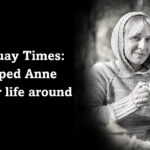
At Merchants Quay Ireland’s residential rehab and detox facility, St. Francis Farm in Tullow, Co. Carlow, we support clients as they bravely embark on their recovery journey. In our detox unit, Clinical Nurse Manager Aoife Fitzharris leads the team of detox nurses helping clients to reduce their drug use until they are ready to enter rehabilitation.
Here, she speaks about what she sees in her role as Clinical Nurse Manager of our detox unit at St. Francis Farm.
Can you describe a typical day at the St. Francis Farm Detox unit?
Every day is different. Typically, our nursing team and our social care team arrive in the morning, and we get a handover of what’s going on for the current clients who are doing their detox. We hear about what’s been going on for them over the past twenty-four hours. Then we would administer any medication that they are due to get that morning. The rest of the day would be spent interacting with the clients to see what was coming up for them and then doing some group facilitation or seminars. We might go with the clients out to the farm to do a couple of hours work which can be therapeutic for them and allow them to talk about what’s going on for them on that particular day. They’ll also be feeling all sorts of physical symptoms from their withdrawals – aches and pains, nausea, vomiting. And so we’d be managing that all day for them.
And then in the background, we have clients who are working to gain access to the service as well. So that would be people who have made their initial contact with us who are preparing to come in for detox. That period can be between three months and six months, and we’d be having weekly conversations with them to check in and see how they’re getting on.
What are some of the challenges faced by people coming into detox?
One of the biggest issues we see is people struggling to access support for their addiction. There are very few places in residential detox and rehab so there is a lot of competition. People wishing to access these limited places have to fight for them and prove that they are committed, so they have to stabalise while in their community to be in with a chance of qualifying. Once someone can get a keyworker in the community to help them, they tend to stabilise quicker, and then they can get on the waiting list to get into detox. But gaining access to these services is difficult because there are so many people trying to get in and so few keyworkers in these areas.
A lot of people also have family relationship issues, or are struggling with homelessness, so we’d be helping them on a day to day basis to find out what is going on for them and support them.

What are some of the common issues that have caused people to become drug-dependent?
Trauma from their past would be the number one issue. So something that has happened to them during their life and they’ve found it very hard to manage, and unfortunately, they’ve turned to substances to take away the pain that they’re feeling and to numb the emotions. Then their life tends to spiral out of control, which can lead to them becoming very physically unwell or suffering from mental health issues. So we see a lot of trauma coming to our service, and hearing other people’s stories and about their backgrounds can be hard for the clients to deal with. While it can make them feel less alone, it can also be triggering.
“Trauma from the past would be the number one issue for people coming into detox.”
How does addiction effect people’s lives?
Usually it affects them on every level, from their physical health to their family relationships, to their mental wellbeing, their job, their housing, everything. Somebody might be lucky and not have any physical side effects from drug addiction for the first few years, but over the number of years, it will begin to affect all aspects. Addiction can cause cardiac problems, people can contract hepatitis from injecting, they can have severe muscle pain in injection sites. Then if they’re struggling with their mental health, any drugs they’re taking makes it much harder to manage that. Addiction affects family relationships, so a lot of clients who come to us will have spent a lot of time isolating themselves away from everybody. While a drug addiction might be something that started out in social situations, 90% of the time it ends up isolating the person from every member of their family and friends.
“While a drug addiction might be something that started out in social situations, 90% of the time it ends up isolating the person from their family and friends.”
How has the COVID-19 pandemic impacted our detox service?
COVID has been a journey. Initially, we heard from a lot of people with hidden addictions that their friends or family or even they themselves might not have noticed, but which became apparent when they were in lockdown. So we were getting a lot more phone calls at the start. We also heard from a lot of people who’d slipped back into addiction or whose addiction had worsened because their community supports and day programmes were gone, and without that structure, and only receiving their key working sessions over the phone, they were isolated, and their addiction just became unmanageable for them then.
“During COVID, we heard from a lot of people whose addiction had worsened because their community supports were gone.”
Here in the Detox, we were lucky that we didn’t have to close, thanks to the nurses and social workers. If it wasn’t for them, we wouldn’t have managed to keep the place going. Everyone’s job roles changed very quickly. The nurses were cooking and cleaning. While our detox and rehab are in two separate buildings, usually everyone would sit down together at mealtimes, but we had to stop doing that during COVID, which meant that we didn’t have a chef here in the Detox. So the staff started cooking, and taking over other roles. But we managed, and we still continued taking new clients in throughout the pandemic. It was difficult for clients though, having to isolate that much, because detox is a very scary time for people, where they feel unwell.
Even now, we still see the consequences of COVID, the effect that isolation has had on addiction in communities. So it is still ongoing, unfortunately.
Have you met any clients recently whose story stands out to you?
There’s nothing as nice as getting a phone call from somebody who’s come through detox and is doing well. It really does lift the spirits of the whole staff here. There was one fella recently who came in from homeless services. He was in a bad way physically, mentally, emotionally. But he started to do really well while in detox and got a lot better. He’d previously had a cancer diagnosis, and while he was in with us in detox, he started complaining of symptoms again, so we got him linked back in with the hospital and unfortunately his cancer had returned. But he went on to MQI rehab anyway, and underwent chemo while completing his rehabilitation. The nurses here in detox kept in contact with him and the MQI staff at High Park brought him to his chemo appointments every day. We all kept in touch with him and followed his journey and thankfully he’s got the all clear now. He’s someone whose journey has been really inspiring and it’s just been really great to see him doing so well. I think often about how thankful I am that he got into detox. It’s one of the stories that really caught me, because I’d worry that if he’d still been in addiction when his illness returned, it might not have been caught.
There are so many incredible stories that come through here. Great stories, helped along by a great staff team.
Our detox facility at St. Francis Farm is located on a working farm in Tullow, Co. Carlow.
For more information, click here.

